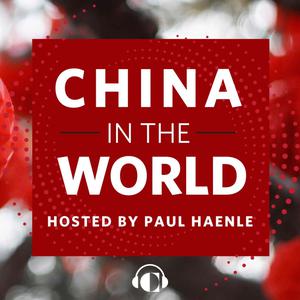
China in the World
Carnegie China
The Carnegie Endowment's China in the World podcast is a series of conversations between Director Paul Haenle and Chinese and international experts on China’s foreign policy, China’s international role, and China’s relations with the world.
- 24 minutes 38 secondsXi and Biden Meet at APEC
In this episode of the China in the World podcast, Paul Haenle speaks with Dr. Ian Chong, non-resident scholar at Carnegie China and Associate Professor of Political Science at the National University of Singapore. The two experts discuss President Biden and Xi's upcoming meeting on the sidelines of the APEC Leaders' Meeting in San Francisco. The two also discuss the current state of U.S.-China relations and how the two powers are viewed from Southeast Asia as well as Dr. Chong's recent article published by Carnegie China, "Amid Contending Narratives, A Read on U.S. and PRC Messaging in Singapore." https://carnegieendowment.org/2023/11/08/amid-contending-narratives-read-on-u.s.-and-prc-messaging-in-singapore-pub-90942
Dr. Chong is a nonresident scholar at Carnegie China, where he examines U.S.-China dynamics in Southeast Asia and the broader Asia-Pacific. Chong is also an associate professor of political science at the National University of Singapore. He received his PhD from Princeton University in 2008 and previously taught at the Hong Kong University of Science and Technology. His research covers the intersection of international and domestic politics, with a focus on the externalities of major power competition, nationalism, regional order, security, contentious politics, and state formation. He also works on U.S.-China relations, security and order in Northeast and Southeast Asia, cross-strait relations, and Taiwan’s politics.
13 November 2023, 2:00 pm - 36 minutes 7 seconds10 Years of US-China Trade Relations
To commemorate the 10th anniversary of the China in the World podcast, Carnegie China is launching a series of lookback episodes, using audio clips from previous interviews to put current international issues in context. For the fifth and final episode in this series, the podcast looks back on 10 years of US-China trade relations.
US-China trade ties have undergone significant changes since the launch of the China in the World podcast. In March 2012, the United States, the EU, and Japan filed a dispute at the World Trade Organization over China’s quota on exporting rare earth metals. That same year, China’s trade surplus with the U.S. reached an all-time high of $315 billion. In 2015, China became the largest bilateral trade partner of the U.S., surpassing Canada for the first time. In March 2018, the Trump administration announced sweeping tariffs on $50 billion worth of Chinese imports, kicking off the U.S.-China trade war. After bilateral negotiations with Beijing broke down in May 2019, the Trump administration raised tariffs from 10 to 25 percent on $200 billion worth of Chinese goods. Finally, in January 2020, the “Phase one” trade deal was signed, relaxing some U.S. tariffs and requiring China to import an additional $200 billion worth of American goods for the next two years. After coming to office in January 2021, the Biden administration maintained the Section 301 tariffs on China and, at the end of 2021, U.S. officials stated that China failed to meet its commitments under the Phase 1 trade deal. In 2023, Treasury Secretary Janet Yellen and Commerce Secretary Gina Raimondo travelled to China and agreed to establish working groups on commercial and financial issues. However, negotiations over structural economic issues such as subsidies, investment restrictions, and non-tariff barriers remain at a standstill. This episode helps shed light on the evolution of U.S.-China trade relations over the past 10 years.
31 October 2023, 8:00 pm - 56 minutes 53 secondsVietnam’s Multialignment Strategy
In this episode of the China in the World podcast, Paul Haenle speaks with Dr. Huong Le Thu, non-resident fellow with the Southeast Asia Program at the Center for Strategic and International Studies. The two discuss Dr. Le Thu’s recent Foreign Affairs article on Vietnam’s “multialignment” strategy, the recent announcement of the U.S.-Vietnam Comprehensive Strategic Partnership, China-Vietnam relations, the 10th anniversary of the Belt and Road Initiative, and how Southeast Asia is responding to China's Global Security Initiative, Global Development Initiative, and Global Civilization Initiative.
Dr. Huong Le Thu, non-resident fellow with the Southeast Asia Program at the Center for Strategic and International Studies. Most recently, she was a senior analyst at the Australian Strategic Policy Institute (ASPI) and a member of the advisory board of the Griffith Asia Institute (GAI) at Griffith University. Her research interests include Vietnam’s defense and foreign policy, Southeast Asia’s security, ASEAN regionalism, and China-Southeast Asia relations.
29 September 2023, 1:00 pm - 46 minutes 44 secondsChina’s Law of the Sea
Amid renewed tensions in the South China Sea, Paul Haenle speaks with Dr. Isaac Kardon, Senior Fellow in the Carnegie Endowment’s Asia Program, about his new book, China’s Law of the Sea: The New Rules of Maritime Order. The two discuss Kardon’s book, China’s approach to international maritime law, the China-Philippines maritime standoff, and more.
Isaac Kardon is a Senior Fellow in the Carnegie Endowment’s Asia Program. Isaac was formerly assistant professor at the U.S. Naval War College, China Maritime Studies Institute, where he researched China’s maritime affairs, and taught naval officers and national security professionals about PRC foreign and security policy. Isaac’s scholarship has centered on China’s development of maritime power, with research on China’s maritime disputes and law of the sea issues, global port development, and PLA overseas basing. His new book, China’s Law of the Sea: The New Rules of Maritime Order (Yale, 2023), can be purchased here: https://www.amazon.com/Chinas-Law-Sea-Rules-Maritime/dp/0300256477.
30 August 2023, 1:00 pm - 1 hour 3 minutesWhat Comes Next for U.S.-China Relations?
In June, U.S. Secretary of State Antony Blinken concluded his first visit to China since the Biden administration entered office, and in July, Treasury Secretary Yellen and Climate Envoy John Kerry travelled to China to engage in discussions with Chinese officials. As the United States and China begin to restart high-level dialogues, there continue to be many unaddressed issues in the relationship, from trade to technology. Will the two sides be able to reopen military dialogues? Can they manage tensions over Taiwan? How will the bilateral relationship evolve ahead of the 2024 U.S. election? On this live Twitter Spaces event, Paul Haenle discusses all these issues and more with Evan Medeiros, Dennis Wilder, Amanda Hsiao, and Chong Ja Ian.
9 August 2023, 1:00 pm - 44 minutes 18 secondsThe 200th Episode: Interviews with Carnegie Scholars
For the 200th episode of the China in the World podcast, Carnegie China looks back on interviews conducted over the last 10 years, highlighting discussions with scholars and experts from the Carnegie Endowment for International Peace. Over the last 10 years, Paul Haenle has hosted dozens of conversations, conducted both online and at Carnegie's office in Beijing, with Carnegie scholars from across Carnegie’s six global centers, covering topics ranging from the U.S.-China relations and China-Russia relations to China-India relations and China-EU relations.
2 August 2023, 1:00 pm - 1 hour 2 minutesThe Ukraine War and China-Russia Relations
After more than one year of conflict, the Russia-Ukraine War continues to drag on. Last week, China’s envoy, Li Hui, traveled throughout European capitals to discuss the potential for a “political settlement” of the Ukraine crisis. Meanwhile, Kiev has launched a counteroffensive in five areas along the front in Donetsk. In the background, China-Russia diplomatic, economic, and military relations remain robust. How is the Ukraine war impacting China-Russia relations? Are there limits to the China-Russia partnership? Will relations between Moscow and Beijing grow more or less asymmetrical in the years to come?
This China in the World podcast was recorded as a live Twitter Spaces discussion featuring Alexander Gabuev, Amy Chew, and Paul Haenle on the state of the Ukraine War and China-Russia relations.
28 June 2023, 1:00 pm - 1 hour 51 secondsChina’s Rising Influence in the Middle East
Although traditionally focused on economic engagement in the Middle East, in recent months China has indicated a greater willingness to engage in regional conflict mediation. The Saudi-Iran normalization agreement, brokered in Beijing, speaks to China’s growing involvement in regional political and security issues. Chinese officials have also expressed interest in de-escalating the Israel-Palestine crisis and renewing the Iran nuclear deal. Meanwhile, the United States appears to be shifting its strategic focus toward the Indo-Pacific and Eastern Europe. Will China replace the United States as the leading outside power in the Middle East? What role can Beijing play in meditating regional disputes? How are Middle Eastern states responding to rising U.S.-China rivalry?
In this live recording of the China in the World podcast, Paul Haenle moderated a discussion with Maha Yahya, Yu Jie, and Benjamin Ho on the key issues in China-Middle East relations. This panel is the fifth of the Carnegie Global Dialogue Series 2022-2023 and is also available to be watch at CarnegieChina.org.
https://carnegieendowment.org/2023/06/08/china-s-rising-influence-in-middle-east-event-8107
14 June 2023, 1:00 pm - 49 minutes 28 secondsEmpires of Ideas: Higher Education in China and the United States
In this episode of the China in the World podcast, Paul Haenle speaks with William C. Kirby, T.M. Chang Professor of China Studies and Spangler Family Professor of Business Administration at Harvard University. The discussion highlights Dr. Kirby’s new book, Empires of Ideas: Creating the Modern University from Germany to America to China (Harvard University Press: 2022). Kirby’s book chronicles two revolutions in higher education over the last two centuries–the birth of the research university and its integration with the liberal education model–drawing illuminating comparisons between notable universities in the United States, Germany, and China. Haenle and Kirby also discuss current events such as the Biden administration’s economic policy toward China, articulated in recent speeches by Treasury Secretary Janet Yellen and National Security Advisor Jake Sullivan, as well as rising U.S.-China tensions over Taiwan.
William C. Kirby is the T. M. Chang Professor of China Studies at Harvard University and Spangler Family Professor of Business Administration at the Harvard Business School. He is a Harvard University Distinguished Service Professor. He serves as Chairman of the Harvard China Fund, the University's academic venture fund for China, and Faculty Chair of the Harvard Center Shanghai, Harvard's first University-wide center located outside the United States. A historian of modern China, Kirby's work examines contemporary China's business, economic, and political development in an international context. He writes and teaches on the growth of modern companies in China (Chinese and foreign; state-owned and private); Chinese corporate law and company structure; business relations across Greater China (PRC, Taiwan, Hong Kong); and China's relations with the United States and Europe.
Empire of Ideas can be purchased here: https://www.hup.harvard.edu/catalog.php?isbn=9780674737716
8 May 2023, 1:00 pm - 1 hour 1 minuteThe China Policy George W. Bush Handed to Barack Obama
U.S.-China relations and East Asian affairs have evolved significantly over the last two decades. Nonetheless, many of the same questions continue to challenge policymakers in Washington. How should the United States grapple with a rising China? How should it engage militarily and economically in Asia? How does China factor into the United States’ Asia policy?
In a new book, Hand-Off: The Foreign Policy George W. Bush Passed to Barack Obama, National Security Council experts from the Bush administration comment on declassified transition memoranda that provide a firsthand look at the foreign policy the Bush administration turned over to President Obama. Join Paul Haenle as he sits down with three other members of the Bush administration’s National Security Council—Michael J. Green, Meghan O'Sullivan, and Faryar Shirzad—to discuss the evolution of U.S. policy toward China and East Asia.
1 May 2023, 1:00 pm - 1 hour 3 minutesChina-EU Relations One Year into the Ukraine War
As the war in Ukraine drags on, China-EU relations face mounting uncertainties. Beijing has attempted to tread a fine line between maintaining its strategic partnership with Russia, while mitigating downward pressure on relations with the European Union. China’s 12-point position paper is the latest sign of Beijing’s attempt to portray itself as a neutral party to the conflict in Ukraine. On the other hand, China’s failure to use its influence on Russia to respect the UN Charter has cast doubt in Brussels on the sincerity of Beijing’s plan. Despite their differences, China and the EU maintain common interests in promoting global trade and addressing challenges like climate change. How is Beijing’s position on the Ukraine war impacting China-EU relations? Can Brussels and Beijing cooperate on transnational issues, while managing their differences? What role can Europe play in rising U.S.-China competition?
Paul spoke with Dan Baer, senior vice president for policy research and director of the Europe Program at the Carnegie Endowment for International Peace, Chan Heng Chee, Ambassador-at-Large with the Ministry of Foreign Affairs, Singapore and Professor at the Lee Kuan Yew Centre, and Yawei Liu, senior advisor on China at The Carter Center and an adjunct professor of political science at Emory University. This panel is the fourth of the Carnegie Global Dialogue Series 2022-2023 and is available to be viewed on the Carnegie Endowment's website. https://carnegieendowment.org/2023/04/19/china-eu-relations-one-year-into-ukraine-war-event-8073
24 April 2023, 1:30 pm - More Episodes? Get the App
Your feedback is valuable to us. Should you encounter any bugs, glitches, lack of functionality or other problems, please email us on [email protected] or join Moon.FM Telegram Group where you can talk directly to the dev team who are happy to answer any queries.
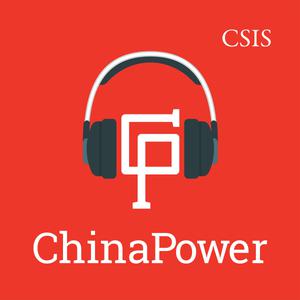 ChinaPower
ChinaPower
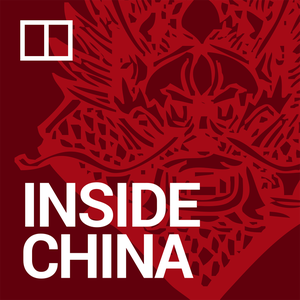 Inside China
Inside China
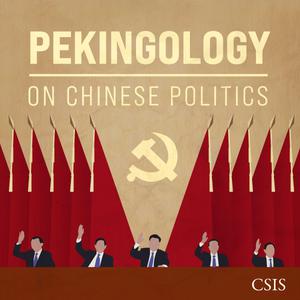 Pekingology
Pekingology
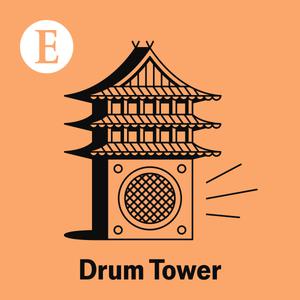 Drum Tower
Drum Tower
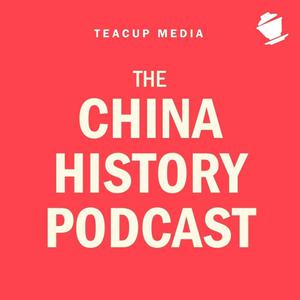 The China History Podcast
The China History Podcast
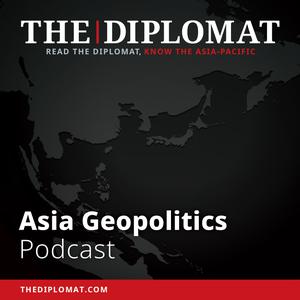 Asia Geopolitics
Asia Geopolitics